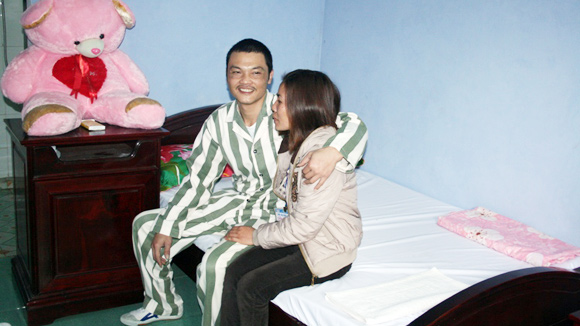Relatives and Inmates Must Comply with These Four Regulations During Visits
This is one of the notable regulations mentioned in Circular 182/2019/TT-BQP issued by the Minister of Defense, stipulating the conditions for prisoners to meet with relatives; receive and send letters; receive gifts, and contact relatives by telephone.
According to the provisions of Article 6 Circular 182/2019/TT-BQP, relatives and inmates serving prison sentences during visits at detention camps and temporary detention centers in the Military must strictly comply with the following regulations:

Illustrative image (source: internet)
- Relatives; individuals; representatives of agencies and organizations visiting inmates must strictly comply with the law, the Rules of the detention facility, the Rules of the visiting house, and follow the guidance of the officers responsible for organizing the visit and other responsible officers. If sending items to inmates, a list of items excluding those on the prohibited list must be declared, and a commitment to take legal responsibility for sending non-conformable items must be made. It is forbidden to bring prohibited items into the visiting house as stipulated by the Minister of National Defense.- When a relative who is a spouse meets the inmate in a private room at the visiting house, their belongings and personal items must be declared for inspection by the responsible officer. Items not allowed inside must be stored in the lockers at the visiting house; a commitment to strictly comply with the rules of the visiting house must be written, assuming responsibility for managing and supervising the inmate during the visit, ensuring the inmate does not violate the law, the Rules of the detention facility, and implementing measures against infectious diseases. Female inmates must practice family planning to ensure the duration of serving their prison sentence.- During communication, visitors and inmates must use the Vietnamese language. In the case of ethnic minorities and foreigners who do not know Vietnamese, other languages may be used. Individuals with hearing or speech impairments may use sign language or communication devices, but these must be checked by the responsible officer beforehand.- Inmates meeting their relatives must wear issued clothes, ensuring neatness and cleanliness. In the case of newly arrived inmates who have not yet been issued clothes (as per the regulations), they may wear ordinary long clothes stamped with "INMATE"; comply strictly with the Rules of the detention facility, the Rules of the visiting house, and follow the guidance of the officers responsible for organizing the visit.
See the full text of the provisions at Circular 182/2019/TT-BQP effective from January 22, 2020.
Thu Ba
- Resolution 190: Guidance on citizen reception, complaint and denunciation resolution during organizational restructuring process in Vietnam
- Provisions on naming and use of seals after the organizational restructuring in Vietnam according to Resolution 190
- Continue to implement regulations related to the operation of four-wheeled vehicles with engines in Vietnam
- Supreme People's Court of Vietnam will conducting asset and income verification of 37 individuals in 2025
- Provision of public information services to support public access to information in particularly difficult communes in Vietnam from April 5, 2025
- General principles for allocating public investment capital from the state budget in Vietnam for the 2026 - 2030 period
-

- Resolution 190: Guidance on citizen reception ...
- 09:00, 22/02/2025
-

- Provisions on naming and use of seals after the ...
- 08:00, 22/02/2025
-

- Continue to implement regulations related to the ...
- 17:30, 21/02/2025
-

- Amendments to regulations on the salary scale ...
- 17:30, 21/02/2025
-

- Supreme People's Court of Vietnam will conducting ...
- 17:00, 21/02/2025
 Article table of contents
Article table of contents
